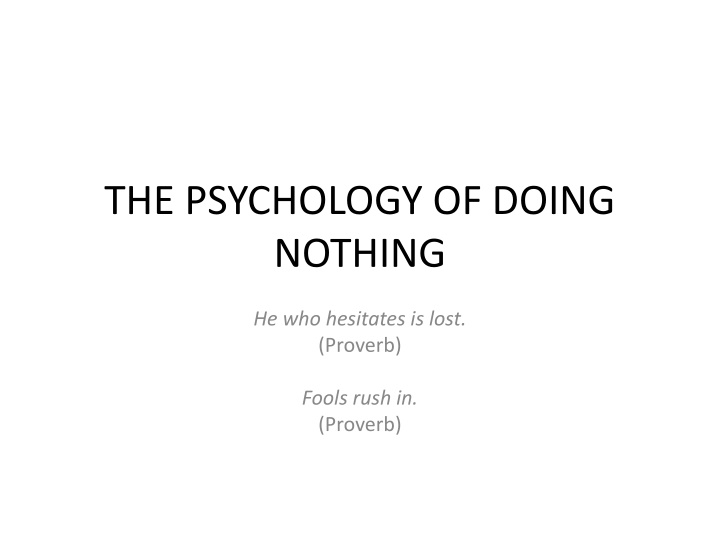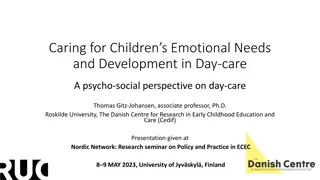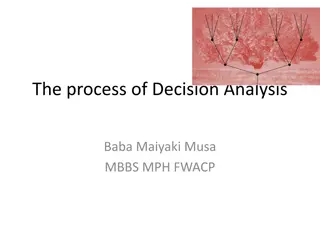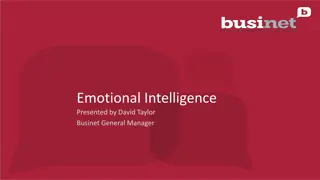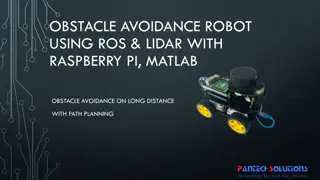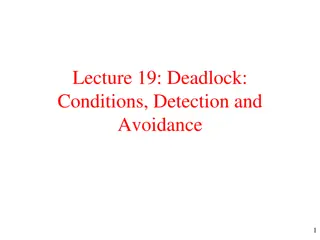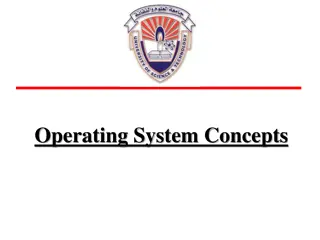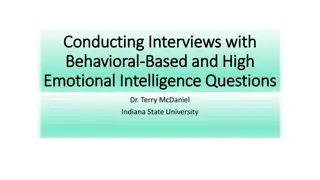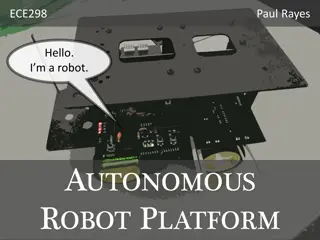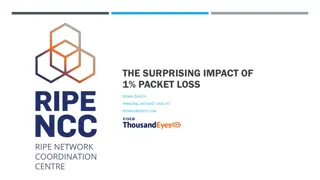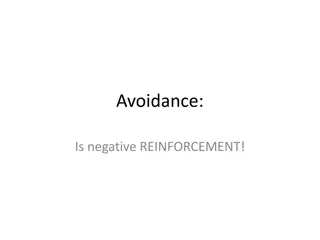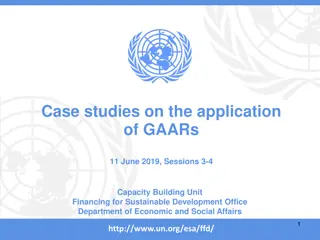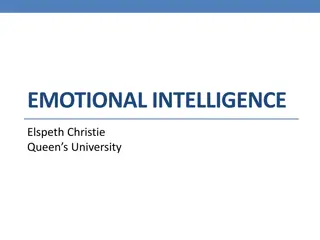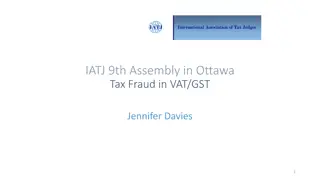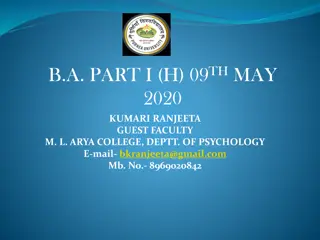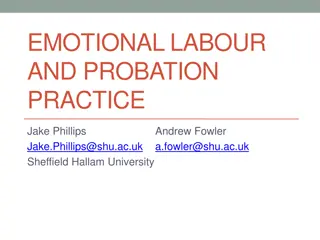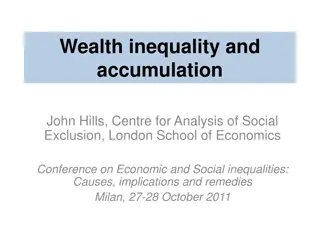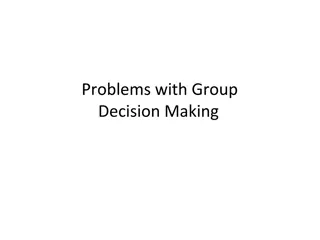Delving into Decision Avoidance and Emotional Paradoxes
This collection examines decision avoidance, emotional contradictions, anticipated regret, forms of avoidance like discounting the future and procrastination, and the allure of inaction. Explore the intricacies of human behavior and the psychology of doing nothing.
Uploaded on Mar 03, 2025 | 0 Views
Download Presentation

Please find below an Image/Link to download the presentation.
The content on the website is provided AS IS for your information and personal use only. It may not be sold, licensed, or shared on other websites without obtaining consent from the author.If you encounter any issues during the download, it is possible that the publisher has removed the file from their server.
You are allowed to download the files provided on this website for personal or commercial use, subject to the condition that they are used lawfully. All files are the property of their respective owners.
The content on the website is provided AS IS for your information and personal use only. It may not be sold, licensed, or shared on other websites without obtaining consent from the author.
E N D
Presentation Transcript
THE PSYCHOLOGY OF DOING NOTHING He who hesitates is lost. (Proverb) Fools rush in. (Proverb)
DECISION AVOIDANCE What is decision avoidance? Why does it matter? What forms does avoidance take? What can we do to protect ourselves from harmful avoidance? When is inaction the highest form of action?
A contradiction We tend to think of emotion as driving us to destruction. Emotion can also restrain us in ways that work against our long term interests.
All end in tears? Anticipated regret: emotions of the future in the present. Comparing what is with what might have been. People tend to make choices that reduce negative emotions
Which do you regret more? Miss plane by 5 minutes? Miss plane by 35 minutes?
FORMS OF AVOIDANCE 1. Discount the future 2. Procrastination 3. Omission 4. Delay choice 5. Status quo 6. Certainty 7. Not broke
DISCOUNTING THE FUTURE Choose between: 100, 000 now, or, 120, 000 in a year s time? Attraction of discounting: instant gratification at expense of greater future benefit
PROCRASTINATION To have an intention but fail to carry it out. Attraction: temporary psychological shelter at the expense of deeper entanglement.
OMISSION Reluctance to accept small risk or cost for a large benefit. Mistakes of omission preferable to mistakes of commission. Attraction: do no harm.
DELAY CHOICE Seek easy way out that involves no action and/or no change Demand more and more information Buck passing Tends to happen when all options are poor
STATUS QUO Preference for the present over a more valuable future Endowment effect over-value what we have. Preference for comfort zones
CERTAINTY Choose between: 500, 000 for sure, or, 50% chance to win 1 million or nothing at all?
Choose again. 500, 000 for sure, 90% chance to win 1 million.
Not broken Refusal to acknowledge emerging problems Often takes a severe shock to force decision- makers to recognise reality a so called wake- up call.
AVOIDING COSTLY INACTION How can we avoid costly inaction without falling into the opposite trap of recklessness? Why worry about tomorrow when it may never come? What should we do when there is too much information or where all options are dire? When is wise to do nothing?
REMEDIES FOR COSTLY INACTION Think ahead the future has a habit of arriving. Don t agree to something just because it is distant.
Fix problems while small, better still before they exist (the Ghost of Christmas Future).
Procrastination banished What exactly would success look like? What needs to be done now?
Always do . what you are afraid to do. (Ralph Waldo Emerson) Or, Screw it: Let s Do It (Richard Branson)
Wish list. Do it now .
If a job is worth doing, it is not always worth doing well. (Tom Peters)
For sustained success make a list of things you hate doing, and, stop doing them. (Tom Peters)
ULTIMATE SUCCESS To care and not to care. (T. S. Elliot)
Remedies for Omission Calculate possible costs of inaction. Do what you never expected to do. Don t be afraid to let unexpected events play out all success is by a winding stair (Francis Bacon)
Remedies for temptation to delay Is the decision really important? (Many are not)
Intelligent Shortcuts Ignore most information For example: flip a coin give me one good reason choose least worst be guided by probability reject choice
Remedies for Status Quo Action this day. (Churchill) The best time to plant a tree was twenty years ago. The next best time is now. (Anon)
Remedies for Risk Avoidance Look for subtle signs of change. One falling leaf may signal autumn.
Remedies for risk avoidance Be careful what value you put on what you already have known as endowment.
When to Take Your Time Some decisions don t need to be made in a hurry. Time brings clarity, allows emotions to cool and sets things in proportion. Time may allow one party to grow their power. Success happens because things coalesce in time
Patience . obtaineth all things. (St Augustine) Time unlocks every door. (Chinese proverb)
But what is patience? Merely that things are not a matter of time. Money flows from the impatient to the patient. (Poker saying) There is a difference between taking your time and being slow.
Above all don t reaction to everything that seems to demand a reaction. Choosing not to do something me be as fateful as choosing to do something. Retreat contains a nugget of aggression.
COMING SOON . Knee deep in the big muddy. Escalation of Commitment
